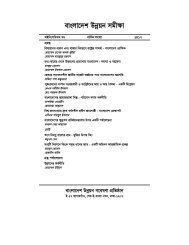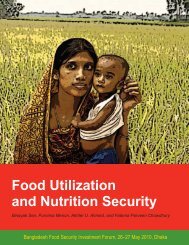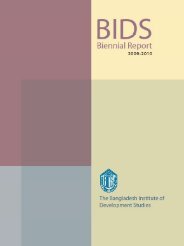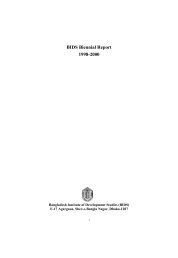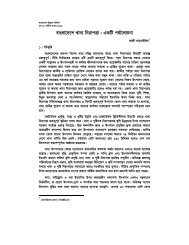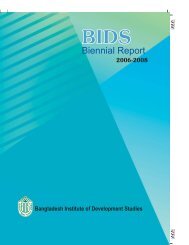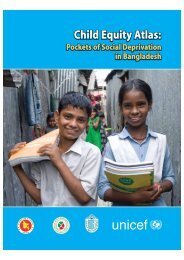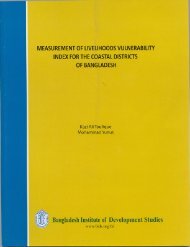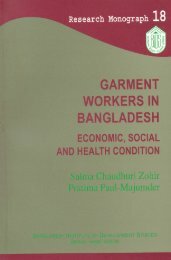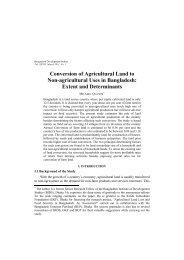INTEGRATED PROTECTED AREA CO-MANAGEMENT (IPAC) - BIDS
INTEGRATED PROTECTED AREA CO-MANAGEMENT (IPAC) - BIDS
INTEGRATED PROTECTED AREA CO-MANAGEMENT (IPAC) - BIDS
Create successful ePaper yourself
Turn your PDF publications into a flip-book with our unique Google optimized e-Paper software.
consequence, the harvesters especially the fishermen cannot negotiate price as the fish products<br />
are purchased by the Aratdars through Mahajans or Paikars. In fact, the bottom layer actors of<br />
the value chains have nothing much to bargain or negotiate prices or fixing up wages at the least.<br />
They have to sell their collected products at a price determined by the Aratdars, in most of the<br />
cases. Our field survey shows that the collectors have to sell their collected products at a price<br />
reduced by approximately 22.5 percent compared to the prevailing market price. Besides, the<br />
purchasers also take additional share for the dadons apart from making pilferage in terms of<br />
weights of quantity of the purchased products, especially aquatic products (crab, fish).<br />
Hence, enhancing bargaining power of the harvesters is imperative.<br />
Access to Market Information<br />
The bottom layer actors are not much aware of the market situation. They have to depend on the<br />
Aratdars. So, better access to the current market information has to be ensured. Barriers to entry,<br />
poor infrastructure, inadequate communications, and high transaction and transport costs make<br />
the markets in favor of buyers.<br />
Form Collectors’ Organization<br />
In order to safeguarding the rights of the collectors and capacity of the collectors to negotiate<br />
selling prices, it is important to form collectors’ organizations, similar to that of the higher-level<br />
intermediaries such as Aratdars.<br />
Involvement of NGOs<br />
The involvement of NGOs in SRF activities, particularly in remote areas (where there is no<br />
bank), would be a step forward.<br />
Awareness on access to loans and market information<br />
Collectors have to be made well informed regarding opportunities. Awareness on bank loans,<br />
market information and aspect related to SRF extractions has to be raised among the actors.<br />
Banks, government or NGOs can design media campaign or use the benefit of mobile<br />
technology and SMS generations.<br />
SRF Actors Groups/Cooperatives/Associations<br />
One way of reducing vulnerability of the lower-layer actors of value chains is to organize<br />
Groups or Cooperatives. In effect, this is expected to also reduce exploitations. Greater returns<br />
could also be secured for harvesters through organizing and pooling their resources 98 . This<br />
would help create storage, post-harvest processing, and refrigeration facilities and encourage<br />
shared transportation on a collective and cooperative basis 99 . One can mention, in this respect,<br />
the success story of Center for Coastal and Environmental Conservation (CCEC) in organizing<br />
the SRF harvesters (Bawalis and Mawalis) to form cooperatives for the betterment of their<br />
members in terms of investment and profits out of their harvests. Not only these cooperatives<br />
have proved beneficial in income generation but also contributed to their confidence building,<br />
98 In West Bengal Sundarbans, honey is reportedly bought and marketed by FD.<br />
99 Although our overall experience with cooperatives has not been very good, but one can also cite Milk Vitae as<br />
an example of success based on cooperatives.<br />
163



